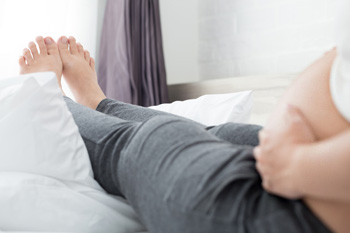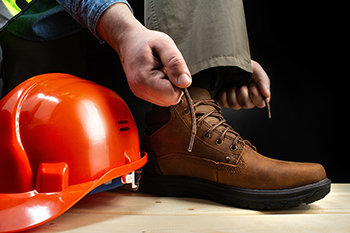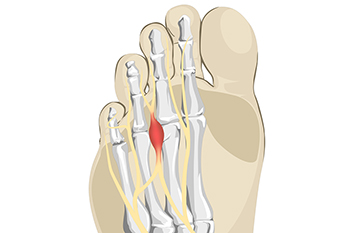Connect With Us
Blog
Items filtered by date: February 2023
Does Foot Swelling Go Away After Pregnancy?

One well-known symptom of being pregnant is having feet that are increased in size. There are many different reasons why this phenomenon occurs. For example, pregnancy can cause swelling in the feet, which will increase the feet in size. Additionally, certain hormones released during pregnancy relax ligaments, which can ultimately result in the spreading of the foot bones. Many pregnant women will often want to know whether or not this increase in foot size is permanent. The answer might not be straightforward. The reason for this is that although foot swelling can eventually subside within a month following the birth of the baby, the spreading of the foot could potentially be longer lasting. If you are pregnant or are planning to be, it is suggested that you contact a podiatrist to help manage the health of your feet during your pregnancy.
Pregnant women with swollen feet can be treated with a variety of different methods that are readily available. For more information about other cures for swollen feet during pregnancy, consult with Dr. Michael D. Garvin from Florida. Our doctor will attend to all of your foot and ankle needs.
What Foot Problems Can Arise During Pregnancy?
One problem that can occur is overpronation, which occurs when the arch of the foot flattens and tends to roll inward. This can cause pain and discomfort in your heels while you’re walking or even just standing up, trying to support your baby.
Another problem is edema, or swelling in the extremities. This often affects the feet during pregnancy but tends to occur in the later stages.
How Can I Keep My Feet Healthy During Pregnancy?
- Wearing orthotics can provide extra support for the feet and help distribute weight evenly
- Minimize the amount of time spent walking barefoot
- Wear shoes with good arch support
- Wear shoes that allow for good circulation to the feet
- Elevate feet if you experience swelling
- Massage your feet
- Get regular, light exercise, such as walking, to promote blood circulation to the feet
If you have any questions please feel free to contact our offices located in Port St. Lucie, FL . We offer the newest diagnostic and treatment technologies for all your foot and ankle needs.
Excess Weight May Lead To Having Heel Pain

People who carry additional weight on their body frame may find they have foot pain. The feet carry the weight of the body and painful foot conditions may develop from the excess pounds. Heel pain can be common in people who are overweight and may be indicative of plantar fasciitis, which is an inflamed plantar fascia. This is the band of tissue that is found on the bottom of the feet and connects the heels to the toes. The extra weight can put pressure on this portion of tissue, often resulting in chronic heel pain. Maintaining a consistent exercise program is often necessary to lose weight and having heel pain can make it difficult to pursue. The overall body can benefit from losing additional weight. This can be accomplished by incorporating healthy foods into daily eating habits and starting out with performing gentle stretches. If you are overweight and have any type of foot or heel pain, it is strongly advised that you speak with a podiatrist who can help you with treatment options and offer suggestions for successful weight loss.
The more you weigh, the harder your feet must work to support your body. If you’re an obese individual and are concerned about your feet, contact Dr. Michael D. Garvin from Florida. Our doctor can provide the care you need to keep you pain-free and on your feet.
Obesity and Your Feet
People who are overweight are putting more pressure on their ankles, knees, and hips as well as their feet. This unfortunately can lead to variety of different issues.
Problems & Complications Stemming from Obesity
- When the body is overweight, it tries to compensate by changing the way that it moves. An obese person may lean forward and put extra weight on the wrong part of the foot. This puts unnecessary stress on the feet.
- Obese people are also more likely to develop type II diabetes which is a condition that causes a lot of foot problems. People with diabetes often don’t feel the cuts and sores that they may have on their feet, which can lead to more complicated and severe issues.
- Plantar fasciitis is another foot condition that can be caused by obesity. Plantar fasciitis is an inflammation of the tissue along the bottom of the foot, which causes pain and stiffness while walking and climbing stairs.
If you have any questions, please feel free to contact our offices located in Port St. Lucie, FL . We offer the newest diagnostic and treatment technologies for all your foot care needs.
Preventing Foot Problems if You Work on Your Feet

Some jobs require one to stand on their feet for prolonged time periods. This can cause tiredness and increase the risk of foot problems as it puts strain on bones, joints, tendons, muscles, and ligaments. Standing for long periods of time can reduce blood flow to the lower extremities or create an accumulation of blood in the foot or ankles, also leading to soreness. Flat feet, plantar fasciitis, and edema are all problems associated with working on your feet all day. Tips for preventing such pain include taking more seated breaks, standing on different surfaces, using anti-fatigue mats underfoot, and wearing appropriate footwear. Footwear includes shoes and socks, and both should fit well, without being too tight or loose. Shoes should support the arch well and have cushioning that absorbs shock and stress. If you work on your feet all day and have foot problems, see a podiatrist who can provide additional suggestions to help you feel more comfortable.
While working on the feet, it is important to take the proper care of them. For more information about working on your feet, contact Dr. Michael D. Garvin from Florida. Our doctor will treat your foot and ankle needs.
Working on Your Feet
Standing on your feet for long periods of time can cause stress and pain in your feet. Your whole body may experience change in terms of posture, back pain, bunions, callouses and or plantar warts. There are ways to avoid these conditions with proper foot care, smart choices and correct posture.
Positive Changes
Negative heeled shoe – Choosing this shoe type places the heel slightly lower than the ball of the foot. These are great for overall foot health. Find shoes that fit you correctly.
Go barefoot – Our feet were not designed to be enclosed for all hours of the day. Try to periodically expose your feet to air.
Eliminate Pain
Foot Exercises – Performing simple exercises, incorporating yoga and doing stretches are beneficial. This will allow increased blood flow to the area and muscles of the foot.
Achilles tendon – Stretching the foot out flat on the floor will relax the calf muscles and tendon. These exercises can be performed almost anywhere. Make sure you add these exercises to your daily regimen.
With a little bit of this information and knowing more about foot health, you will notice changes. Foot stretches and proper footwear will help with pain and prevent further issues.
If you have any questions please feel free to contact our offices located in Port St. Lucie, FL . We offer the newest diagnostic and treatment technologies for all your foot and ankle needs.
Heel Pain Can Be Treated!
A Common Cause of Morton’s Neuroma

The foot condition that is known as Morton’s neuroma affects the nerve between the third and fourth toes. It generally happens to women who frequently wear high heels, which can compress the toes. In severe cases, the pain can be excruciating, and relief methods are often sought. The symptoms that many patients feel can be likened to having a small pebble or stone in the shoe, and the foot may tingle or feel numb. In mild cases, temporary relief may be found when wider shoes are worn with a low heel, and extra weight is shed, if applicable. Additionally, wearing soft insoles in wider shoes may help to lessen the pressure on the nerve. People who suffer from Morton’s neuroma often seek the counsel of a podiatrist, who can recommend the correct treatment, which may include surgery for the removal of the nerve.
Morton’s neuroma is a very uncomfortable condition to live with. If you think you have Morton’s neuroma, contact Dr. Michael D. Garvin of Florida. Our doctor will attend to all of your foot care needs and answer any of your related questions.
Morton’s Neuroma
Morton's neuroma is a painful foot condition that commonly affects the areas between the second and third or third and fourth toe, although other areas of the foot are also susceptible. Morton’s neuroma is caused by an inflamed nerve in the foot that is being squeezed and aggravated by surrounding bones.
What Increases the Chances of Having Morton’s Neuroma?
- Ill-fitting high heels or shoes that add pressure to the toe or foot
- Jogging, running or any sport that involves constant impact to the foot
- Flat feet, bunions, and any other foot deformities
Morton’s neuroma is a very treatable condition. Orthotics and shoe inserts can often be used to alleviate the pain on the forefront of the feet. In more severe cases, corticosteroids can also be prescribed. In order to figure out the best treatment for your neuroma, it’s recommended to seek the care of a podiatrist who can diagnose your condition and provide different treatment options.
If you have any questions, please feel free to contact our offices located in Port St. Lucie, FL . We offer the newest diagnostic and treatment technologies for all your foot care needs.
Blog Archives
- April 2025
- March 2025
- February 2025
- January 2025
- December 2024
- November 2024
- October 2024
- September 2024
- August 2024
- July 2024
- June 2024
- May 2024
- April 2024
- March 2024
- February 2024
- January 2024
- December 2023
- November 2023
- October 2023
- September 2023
- August 2023
- July 2023
- June 2023
- May 2023
- April 2023
- March 2023
- February 2023
- January 2023
- December 2022
- November 2022
- October 2022
- September 2022
- August 2022
- July 2022
- June 2022
- May 2022
- April 2022
- March 2022
- February 2022
- January 2022
- December 2021
- November 2021
- October 2021
- September 2021
- August 2021
- July 2021
- June 2021
- May 2021
- April 2021
- March 2021
- February 2021
- January 2021
- December 2020
- November 2020
- October 2020
- September 2020
- August 2020
- July 2020
- June 2020
- May 2020
- April 2020
- March 2020
- February 2020
- January 2020
- December 2019
- November 2019
- October 2019
- September 2019
- August 2019
- July 2019
- June 2019
- May 2019
- April 2019
- March 2019
- February 2019
- January 2019
- December 2018
- November 2018
- October 2018
- September 2018
- August 2018
- July 2018
- June 2018
- May 2018
- April 2018
- March 2018
- February 2018
- January 2018
- December 2017
- November 2017
- October 2017
- September 2017
- August 2017
- July 2017
- June 2017
- May 2017
- April 2017
- March 2017
- February 2017
- January 2017
- December 2016
- November 2016
- October 2016
- September 2016
- August 2016

